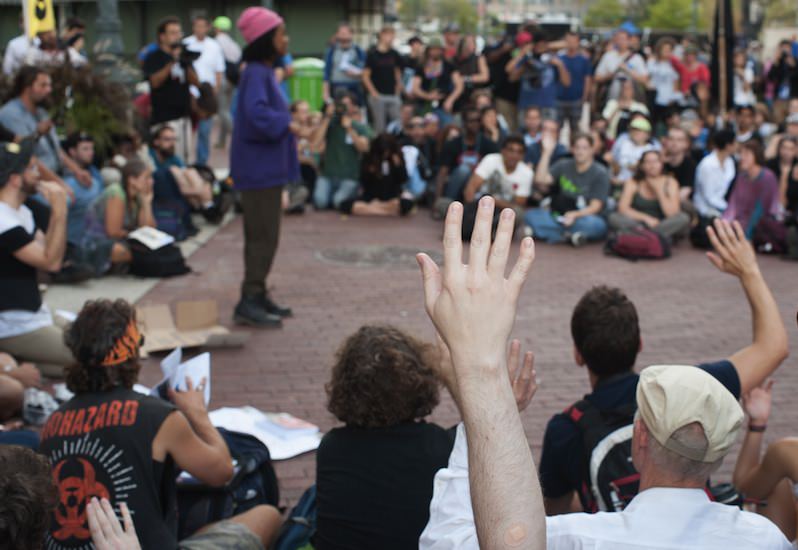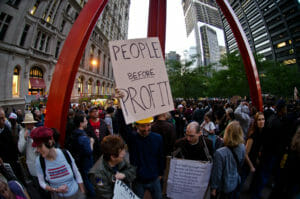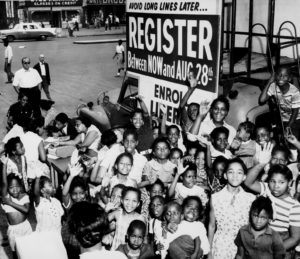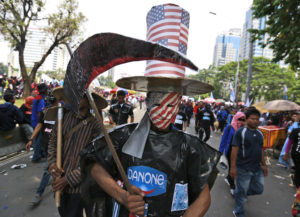A Third Lens: Why Awareness of Class Cultures Can Strengthen Movements for Social Change
Bringing a class analysis to our understanding of privilege can help make sense of a broad range of experiences. Occupy Wall Street activists plan for the one year anniversary of protest in Zuccotti Park in New York City on Sept. 16, 2012. Shutterstock
Occupy Wall Street activists plan for the one year anniversary of protest in Zuccotti Park in New York City on Sept. 16, 2012. Shutterstock
Many years ago I was involved in a small group of activists interested in opening a community space in our neighborhood where people could gather, watch films, take classes and do political organizing. We were a racially diverse group, and women were quite well represented. After many meetings and even a successful fundraiser for our project, we began noticing that we were unable to achieve anything because one member of our group was extremely domineering and derailed most of the focus we managed to muster. Eventually when none of us found we could confront the troublemaker, the group disbanded, our mission left unfulfilled. I could never really put my finger on why we failed.
My experience is, sadly, typical. Most activists have at least one such encounter under their belt within the first few years of organizing work. The main work of political activism happens over the course of unglamorous and often endless meetings, where, because of cultural, educational, racial, gender, age or occupational differences, conflicts arise and remain unresolved, bogging many groups down in endless arguing, accusations and infighting. The Occupy Wall Street movement was plagued almost from the start with conflicts that were pegged to the racial and gender privilege of key players. But even in a movement that at its heart took on wealth inequality, class privilege was less often discussed and debated.
Now, a new book by one of the nation’s leading progressive activists studying class tackles this issue head on. Betsy Leondar-Wright, program director at the Boston-based group Class Action, has written “Missing Class: Strengthening Social Movement Groups by Seeing Class Cultures.” Leondar-Wright’s earlier books include “Class Matters: Cross-Class Alliance Building for Middle Class Activists” and “The Color of Wealth: The Story Behind the U.S. Racial Wealth Divide.”
In an interview on Uprising, Leondar-Wright shared with me how, because of the hard work of racial justice and feminist activists, most people today recognize race or gender privilege, but rarely, if ever, acknowledge class differences. In an extensive and academically rigorous study spanning years, she attended dozens of group meetings, recorded them, interviewed hundreds of attendees in order to determine their class backgrounds, and then reviewed the recordings to see if patterns emerged.
Her findings on the extent to which people’s behavior depended on class were surprising. When Leondar-Wright first began gathering the data, she expected gender and race to be greater drivers of people’s behavior patterns. Instead, she said she found, “By far the most commonalities were among people of similar class, even if they were different by race, gender, age, generation and issue.”
It should come as no surprise to us that just as people of the same gender share common experiences and people from the same racial group speak in similar cultural codes, what Leondar-Wright calls “class cultures” also exist and bind people together. For example, a group she classifies as “Lower Professionals,” meaning those people who are “college educated, and so were their parents, but not in elite schools, and they and their parents didn’t work at the top of hierarchies,” it turns out were the biggest “conflict avoiders.” Leondar-Wright explained that this meant “they rarely raised things to people’s faces.”
“When leftists talk about class,” she said, “it’s usually about the unfair rules of the economy, the way things are rigged so that the haves get more and the have-nots get less.” In some ways, effective as the rhetoric of “we are the 99 percent” was for the Occupy Wall Street movement, it obscured the real class differences between people of the working class and those of the professional class within the broad spectrum of Americans who are not super-rich. “In fact, our class background influences us profoundly,” Leondar-Wright said. “We always have that starting place of the class that we grew up in and there are far more firm patterns than most people suspect.”
For example, upper middle class (UMC) people, who are second or third generation to go to college in elite schools, “whatever their race,” Leondar-Wright said, “talked in these typically college-educated ways of using a lot more abstract terms, with generalizations playing much bigger roles than stories or examples.” Upon hearing this description, I instantly thought of several of my own highly educated activist friends of varying races and genders (Jewish male, Latina) using the words “dialectic” and “praxis” within group interactions. But even simpler words like “context” and “perspective” are more often used by UMC activists than by those in other classes in day-to-day language.
In contrast, working-class activists — defined as those people who have not themselves nor their parents attended college — tended to use “more concrete names, places, events and action verbs in their talk about making social change.” Additionally, according to Leondar-Wright, they “would turn to a metaphor and analogy” more often, even if there were differences in dialects, accents or aphorisms among them. She found that even stronger than their race or gender, the class culture of working-class activists tended to be a greater commonality among them. We tend to conflate especially race and class with each other, often assuming people of color are poor, or that whites are middle or upper class. Leondar-Wright, who regularly conducts workshops on class, finds that well-educated people of color and poor whites are the two groups most grateful for her analysis. Of course there is a strong connection between historically discriminated groups and poverty, but it is a correlation, not a rule.
Bringing a class analysis to our understanding of privilege can help make sense of a broad range of experiences. For example, in the recent essay by Princeton freshman Tal Fortgang titled “Checking My Privilege: Character as the Basis of Privilege,” which went viral, a class analysis would have proven the young man wrong. Leondar-Wright characterized his position as “absurdly defensive about his male privilege and his white privilege.
“But,” she said, “it doesn’t seem to even occur to him to check his class privilege. From the laudatory bootstraps story he tells about his noble immigrant grandparents and parents, it seems likely that they were highly educated and carried cultural capital with them into the U.S.”
Although there have been some excellent rebuttals to Fortgang’s essay, such as this one and this one, Leondar-Wright was disappointed, noting, “it says something about the sad state of American class consciousness today that no Princeton progressives provoked him with questions about his class background.”
What is laudable about Leondar-Wright’s analysis is that acknowledging class does not mean we ought to de-emphasize the crucial racial and gender analyses of our interactions with one another. In fact, she acknowledges in her book that “looking through the class lens can add context and complexity. … The three lenses [of race, gender and class] are not three alternatives, three competing interpretations of a given situation, but three interwoven strands.”
Leondar-Wright asks, “If class culture differences were named and understood, what new solutions to voluntary group troubles would be possible?” Indeed, since reading her book “Missing Class,” that is a question I have found myself asking about the conflicts I have personally witnessed in many settings of political organizing — including in the failed attempt to organize a community space all those years ago.
Your support matters…Independent journalism is under threat and overshadowed by heavily funded mainstream media.
You can help level the playing field. Become a member.
Your tax-deductible contribution keeps us digging beneath the headlines to give you thought-provoking, investigative reporting and analysis that unearths what's really happening- without compromise.
Give today to support our courageous, independent journalists.






You need to be a supporter to comment.
There are currently no responses to this article.
Be the first to respond.